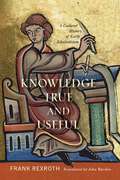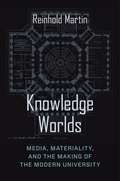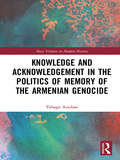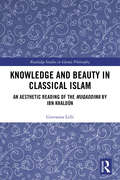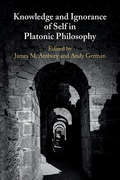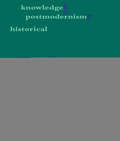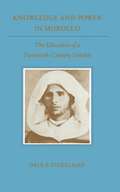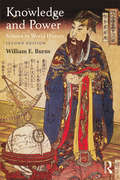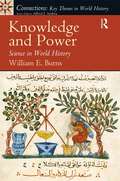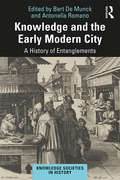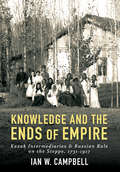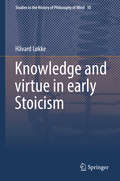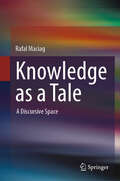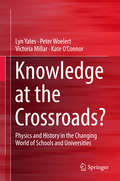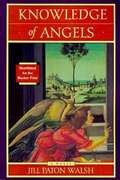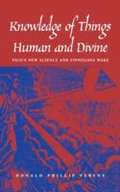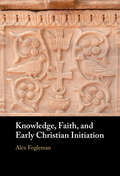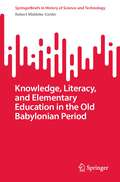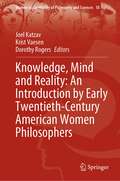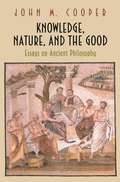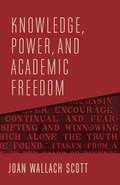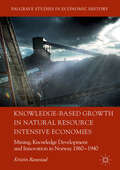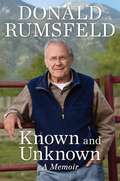- Table View
- List View
Knowledge True and Useful: A Cultural History of Early Scholasticism (The Middle Ages Series)
by Frank RexrothA radical shift took place in medieval Europe that still shapes contemporary intellectual life: freeing themselves from the fixed beliefs of the past, scholars began to determine and pursue their own avenues of academic inquiry. In Knowledge True and Useful, Frank Rexroth shows how, beginning in the 1070s, a new kind of knowledge arose in Latin Europe that for the first time could be deemed “scientific.”In the twelfth century, when Peter Abelard proclaimed the primacy of reason in all areas of inquiry (and started an affair with his pupil Heloise), it was a scandal. But he was not the only one who wanted to devote his life to this new enterprise of “scholastic” knowledge. Rexroth explores how the first students and teachers of this movement came together in new groups and schools, examining their intellectual debates and disputes as well as the lifelong connections they forged with one another through the scholastic communities to which they belonged.Rexroth shows how the resulting transformations produced a new understanding of truth and the utility of learning, as well as a new perspective on the intellectual tradition and the division of knowledge into academic disciplines—marking a turning point in European intellectual culture that culminated in the birth of the university and, with it, traditions and forms of academic inquiry that continue to organize the pursuit of knowledge today.
Knowledge Worlds: Media, Materiality, and the Making of the Modern University
by Reinhold MartinWhat do the technical practices, procedures, and systems that have shaped institutions of higher learning in the United States, from the Ivy League and women’s colleges to historically black colleges and land-grant universities, teach us about the production and distribution of knowledge? Addressing media theory, architectural history, and the history of academia, Knowledge Worlds reconceives the university as a media complex comprising a network of infrastructures and operations through which knowledge is made, conveyed, and withheld.Reinhold Martin argues that the material infrastructures of the modern university—the architecture of academic buildings, the configuration of seminar tables, the organization of campus plans—reveal the ways in which knowledge is created and reproduced in different kinds of institutions. He reconstructs changes in aesthetic strategies, pedagogical techniques, and political economy to show how the boundaries that govern higher education have shifted over the past two centuries. From colleges chartered as rights-bearing corporations to research universities conceived as knowledge factories, educating some has always depended upon excluding others. Knowledge Worlds shows how the division of intellectual labor was redrawn as new students entered, expertise circulated, science repurposed old myths, and humanists cultivated new forms of social and intellectual capital. Combining histories of architecture, technology, knowledge, and institutions into a critical media history, Martin traces the uneven movement in the academy from liberal to neoliberal reason.
Knowledge and Acknowledgement in the Politics of Memory of the Armenian Genocide (Mass Violence in Modern History)
by Vahagn AvedianIs the Armenian Genocide a strictly historical matter? If that is the case, why is it still a topical issue, capable of causing diplomatic rows and heated debates? The short answer would be that the century old Armenian Genocide is much more than a historical question. It emerged as a political dilemma on the international arena at the San Stefano peace conference in 1878 and has remained as such into our days. The disparity between knowledge and acknowledgement, mainly ascribable to Turkey’s official denial of the genocide, has only heightened the politicization of the Armenian question. Thus, the memories of the WWI era refuse to be relegated to the pages of history but are rather perceived as a vivid presence. This is the result of the perpetual process of politics of memory. The politics of memory is an intricate and interdisciplinary negotiation, engaging many different actors in the society who have access to a wide range of resources and measures in order to achieve their goals. By following the Armenian question during the past century up to its Centennial Commemoration in 2015, this study aims to explain why and how the politics of memory of the Armenian Genocide has kept it as a topical issue in our days.
Knowledge and Beauty in Classical Islam: An Aesthetic Reading of the Muqaddima by Ibn Khaldūn (Routledge Studies in Islamic Philosophy)
by Giovanna LelliThis volume offers an aesthetic reading of the Muqaddima by Ibn Khaldūn (d. 1406), a text that has been studied up to the present as a work on historiography. It argues that the Muqaddima is also a comprehensive treatise on classical Arab-Islamic culture and provides a picture of classical Arab-Islamic aesthetics in its totality. The theme of the book is the intrinsic connection between beauty and knowledge in the Muqaddima. Whenever Ibn Khaldūn deals with the problem of knowledge and science, he also deals with the problem of sensual beauty as an instrument or an obstacle to attain it. Ibn Khaldūn’s philosophy of history is necessarily also an aesthetics of history. His key-notion of “group feeling”, the physical, ethic and aesthetic virtue of Bedouin societies, is at once the origin of the ascent of centralised States and the cause of their ruin. It represents a tragic contradiction that applies to the history of the Maghreb but then takes a universal value. It reflects a range of other contradictions inherent to the "system" of classical Arab-Islamic aesthetics. These contradictions undermine the aesthetic system of the Muqaddima from within and provide decisive elements for the emergence of modern aesthetics. Offering a comparative approach, the volume is a key resource to scholars and students interested in Arabic and Islamic studies, philosophy, aesthetics and global history.
Knowledge and Ignorance of Self in Platonic Philosophy
by Andy German James M. AmburyKnowledge and Ignorance of Self in Platonic Philosophy is the first volume of essays dedicated to the whole question of self-knowledge and its role in Platonic philosophy. It brings together established and rising scholars from every interpretative school of Plato studies, and a variety of texts from across Plato's corpus - including the classic discussions of self-knowledge in the Charmides and Alcibiades I, and dialogues such as the Republic, Theaetetus, and Theages, which are not often enough mined for insights about this crucial philosophical topic. The rich variety of readings and hermeneutical methods (as well as the comprehensive research bibliography included in the volume) allows for an encompassing view of the relevant scholarly debates. The volume is intended to serve as a standard resource for further research on Plato's treatment of self-knowledge, and will highlight the relevance of Plato's thought to contemporary debates on selfhood, self-reflection and subjectivity.
Knowledge and Postmodernism in Historical Perspective
by Appleby Joyce Covington Elizabeth Hoyt David Latham Michael Sneider AllisonThis comprehensive reader chronicles the western engagement with the nature of knowledge during the past four centuries while providing the historical context for the postmodernist thought of Jacques Derrida, Michel Foucault, Richard Rorty and Hayden White, and the challenges their ideas have posed to our conventional ways of thinking, writing and knowing.
Knowledge and Power in Morocco: The Education of a Twentieth-Century Notable (Princeton Studies on the Near East #1)
by Dale F. EickelmanThis intensive social biography of a rural Moroccan judge discusses Islamic education, the concept of knowledge it embodies, and its communication from the early years of colonial rule in twentieth-century Morocco to the present. The work sensitively combines the outlooks and perceptions of the author and those of the shrewd and reflective `Abd ar-Rahman, supplementing our knowledge of resurgent militant Islamic movements by describing other popularly supported Islamic attitudes toward the contemporary world.
Knowledge and Power: Science in World History
by William BurnsKnowledge and Power presents and explores science not as something specifically for scientists, but as an integral part of human civilization, and traces the development of science through different historical settings from the Middle Ages through to the Cold War. Five case studies are examined within this book: the creation of modern science by Muslims, Christians and Jews in the medieval Mediterranean; the global science of the Jesuit order in the early modern world; the relationship between "modernization" and "westernization" in Russia and Japan from the late seventeenth to the mid-nineteenth century; the role of science in the European colonization of Africa; and the rivalry in "big science" between the United States and the Soviet Union during the Cold War. Each chapter includes original documents to further the reader’s understanding, and this second edition has been enhanced with a selection of new images and a new chapter on Big Science and the Superpowers during the Cold War. Since the Middle Ages, people have been working in many civilizations and cultures to advance knowledge of, and power over, the natural world. Through a combination of narrative and primary sources, Knowledge and Power provides students with an understanding of how different cultures throughout time and across the globe approached science. It is ideal for students of world history and the history of science.
Knowledge and Power: Science in World History
by William BurnsKnowledge and Power shows how science has developed in different historical settings by focusing on four episodes in the history of world science from the Middle Ages to the mid-twentieth century. The title of this book comes from a famous saying by the English Renaissance philosopher Francis Bacon: "Knowledge is Power." Through a combination of narrative and primary sources, author William Burns explores the following topics in order to provide students with an understanding of how different cultures throughout time and across the globe approached science: Science in the Medieval Mediterranean, The Jesuits and World Science ca. 1540-1773, Science in Russia and Japan ca. 1684-1860s, and Africa in the Age of Imperialism and Nationalism ca. 1860-1960.
Knowledge and the Early Modern City: A History of Entanglements (Knowledge Societies in History)
by Antonella Romano Bert De MunckKnowledge and the Early Modern City uses case studies from the sixteenth to the eighteenth centuries to examine the relationships between knowledge and the city and how these changed in a period when the nature and conception of both was drastically transformed. Both knowledge formation and the European city were increasingly caught up in broader institutional structures and regional and global networks of trade and exchange during the early modern period. Moreover, new ideas about the relationship between nature and the transcendent, as well as technological transformations, impacted upon both considerably. This book addresses the entanglement between knowledge production and the early modern urban environment while incorporating approaches to the city and knowledge in which both are seen as emerging from hybrid networks in which human and non-human elements continually interact and acquire meaning. It highlights how new forms of knowledge and new conceptions of the urban co-emerged in highly contingent practices, shedding a new light on present-day ideas about the impact of cities on knowledge production and innovation. Providing the ideal starting point for those seeking to understand the role of urban institutions, actors and spaces in the production of knowledge and the development of the so-called ‘modern’ knowledge society, this is the perfect resource for students and scholars of early modern history and knowledge.
Knowledge and the Ends of Empire: Kazak Intermediaries and Russian Rule on the Steppe, 1731-1917
by Ian W. CampbellIn Knowledge and the Ends of Empire, Ian W. Campbell investigates the connections between knowledge production and policy formation on the Kazak steppes of the Russian Empire. Hoping to better govern the region, tsarist officials were desperate to obtain reliable information about an unfamiliar environment and population. This thirst for knowledge created opportunities for Kazak intermediaries to represent themselves and their landscape to the tsarist state. Because tsarist officials were uncertain of what the steppe was, and disagreed on what could be made of it, Kazaks were able to be part of these debates, at times influencing the policies that were pursued.Drawing on archival materials from Russia and Kazakhstan and a wide range of nineteenth-century periodicals in Russian and Kazak, Campbell tells a story that highlights the contingencies of and opportunities for cooperation with imperial rule. Kazak intermediaries were at first able to put forward their own idiosyncratic views on whether the steppe was to be Muslim or secular, whether it should be a center of stock-raising or of agriculture, and the extent to which local institutions needed to give way to imperial institutions. It was when the tsarist state was most confident in its knowledge of the steppe that it committed its gravest errors by alienating Kazak intermediaries and placing unbearable stresses on pastoral nomads. From the 1890s on, when the dominant visions in St. Petersburg were of large-scale peasant colonization of the steppe and its transformation into a hearth of sedentary agriculture, the same local knowledge that Kazaks had used to negotiate tsarist rule was transformed into a language of resistance.
Knowledge and the Public Interest, 1575–1725
by Vera KellerMany studies relate modern science to modern political and economic thought. Using one shift in order to explain the other, however, has begged the question of modernity's origins. New scientific and political reasoning emerged simultaneously as controversial forms of probabilistic reasoning. Neither could ground the other. They both rejected logical systems in favor of shifting, incomplete, and human-oriented forms of knowledge which did not meet accepted standards of speculative science. This study follows their shared development by tracing one key political stratagem for linking human desires to the advancement of knowledge: the collaborative wish list. Highly controversial at the beginning of the seventeenth century, charismatic desiderata lists spread across Europe, often deployed against traditional sciences. They did not enter the academy for a century but eventually so shaped the deep structures of research that today this once controversial genre appears to be a musty and even pedantic term of art.
Knowledge and virtue in early Stoicism (Studies in the History of Philosophy of Mind #10)
by Håvard LøkkeThis book is about the epistemological views and arguments of the early Stoics. It discusses such questions as: How is knowledge possible, and what is it? How do we perceive things and acquire notions of them? Should we rely on arguments? How do we come to make so many mistakes?The author tries to give a comprehensive and conservative account of Stoic epistemology as a whole as it was developed by Chrysippus. He emphasizes how the epistemological views of the Stoics are interrelated among themselves and with views from Stoic physics and logic.There are a number of Stoic views and arguments that we will never know about. But there are passages on Stoic epistemology in Sextus Empiricus, Galen, Plutarch, Cicero, and a few others authors. The book is like a big jigsaw puzzle of these scattered pieces of evidence.
Knowledge as a Tale: A Discursive Space
by Rafal MaciagThis text describes the process that led to knowledge becoming the most important modern good and a complex phenomenon beginning at the end of the 19th century. It was a change in the way of understanding the world proposed by mathematics and geometry. This volume reveals how the paradigm shift, still in progress, is gradually transforming less obvious fields of science, such as the humanities and social sciences while affecting the phenomenon of knowledge. Firstly, meta-analysis gained importance, and secondly, it became natural to perceive knowledge in a social context, showing its diverse and multi-cause dispersion, leading to the phenomenon of knowledge. Due to the interpretation of knowledge as a complex social phenomenon, the author proposes a new model of knowledge description, called the theory of discursive space, making it possible to describe the role and meaning of knowledge as a component of modern civilization that is all-encompassing. This text appeals to students and researchers working in the philosophy of technology.
Knowledge at the Crossroads?
by Lyn Yates Peter Woelert Victoria Millar Kate O'ConnorThere is much discussion about what needs to change in education institutions in the 21st century, but less attention given to how core disciplinary studies should be considered within that context. This book is based on a major 4-year research study of history and physics in the changing environment of schools and universities in Australia. Are these forms of knowledge still valuable for students? Are they complementary to, or at odds with the concerns about '21st century skills', interdisciplinary and collaborative research teams, employability and 'learner-centred' education? How do those who work in these fields see changes in their disciplines and in their work environment? And what are the similarities and differences between the experiences of teachers and academics in physics and those in history? The book draws on interviews with 115 school teachers and university academics to provide new perspectives on two important issues. Firstly, how, for the purposes of today's schools and universities, can we adequately understand knowledge and knowledge building over time? Secondly, what has been productive and what has been counter-productive in recent efforts to steer and manage the changes in Australia?
Knowledge of Angels
by Jill Paton WalshAmara is abandoned as an infant, raised by wolves then captured by shepherds. She is sent to a convent where she becomes the object of an experiment to determine whether knowledge of God is innate. Palinor, an atheistic humanist prince and castaway seeks refuge on the island but is persecuted by the Catholic Church. Beneditx, a pious scholar, attempts to persuade Palinor that God exists. With the arrival of a special inquisitor from Rome, the clash between secular and conservative ecclesiastical values moves inexorably toward a gruesome climax.
Knowledge of Life
by Kaye PriceKnowledge of Life is the first textbook to provide students with a comprehensive guide to Aboriginal and Torres Strait Islander Australia. The result of extensive research and experience, it offers fresh insights into a range of topics and, most importantly, is written by Aboriginal and Torres Strait Islander academics. It addresses topics ranging from history and reconciliation, to literature and politics, to art, sport and health. It presents social, cultural and political perspectives on these areas in a manner that is accessible to undergraduate students from a range of backgrounds and academic disciplines. Each chapter opens with a précis of the author's journey to engage students and offer them an insight into the author's experiences. These authentic voices encourage students to think about the wider issues surrounding each chapter and their real-life implications. This timely publication emphasises the importance of relationships between non-Indigenous and Aboriginal and Torres Strait Islander cultures.
Knowledge of Things Human and Divine: Vico's New Science and Finnegans Wake
by Donald Phillip VereneThis book takes the reader through the career and works of Giambattista Vico (1668-1744) from a new viewpoint. Two major figures introduced Vico to the twentieth century -- Benedetto Croce and James Joyce. From the mid-twentieth century on there was a growing desire to free Vico from the philosophical idealism of Croce, who in the early part of the century had presented Vico as the Italian Hegel.
Knowledge, Faith, and Early Christian Initiation
by Alex FoglemanIn this book, Alex Fogleman presents a new history of the rise and development of catechesis in Latin Patristic Christianity by focusing on the critical relationship between teaching and epistemology. Through detailed studies of key figures and catechetical texts, he offers a nuanced account of initiation in the Early Christian era to explore fundamental questions in patristic theology: What did early Christians think that it meant to know God, and how could it be taught? What theological commitments and historical circumstances undergirded the formation of the catechumenate? What difference did the Christian confession of Jesus Christ as God-made-flesh make for practices of Christian teaching? Fogleman's study provides a dynamic narrative that encompasses not only the political and social history of Christianity associated with the Constantinian shift in the fourth century but also the modes of teaching and communication that helped to establish Christian identity. This title is part of the Flip it Open Programme and may also be available Open Access. Check our website Cambridge Core for details.
Knowledge, Literacy, and Elementary Education in the Old Babylonian Period (SpringerBriefs in History of Science and Technology)
by Robert Middeke-ConlinThis book examines education as a means to explore knowledge and literacy in the Old Babylonian period. It further employs a new method to research these topics. Contrary to numerous existing studies on the subject, the author examines elementary education globally, that is, in pursuit of Old Babylonian education in its entirety. Typically, education is examined in a piecemeal fashion. It's as if education centered on lexicography alone or mathematics alone. This work encompasses a view about educational content and knowledge systems, as opposed to only specific aspects or branches of them. In doing so, a characterization of institution and society is made possible allowing the work to open new general perspectives on Mesopotamian knowledge, literacy, and education.
Knowledge, Mind and Reality: An Introduction by Early Twentieth-Century American Women Philosophers (Women in the History of Philosophy and Sciences #18)
by Joel Katzav Krist Vaesen Dorothy RogersThis book is the first volume featuring the work of American women philosophers in the first half of the twentieth century. It provides selected papers authored by Mary Whiton Calkins, Grace Andrus de Laguna, Grace Neal Dolson, Marjorie Glicksman Grene, Marjorie Silliman Harris, Thelma Zemo Lavine, Marie Collins Swabey, Ellen Bliss Talbot, Dorothy Walsh and Margaret Floy Washburn. The book also provides the historical and philosophical background to their work. The papers focus on the nature of philosophy, knowledge, the philosophy of science, the mind-matter nexus, the nature of time, and the question of freedom and the individual. The material is suitable for scholars, researchers and advanced philosophy students interested in (history of) philosophy; theories of knowledge; philosophy of science; mind, and reality.
Knowledge, Nature, and the Good: Essays on Ancient Philosophy
by John M. CooperKnowledge, Nature, and the Good brings together some of John Cooper's most important works on ancient philosophy. In thirteen chapters that represent an ideal companion to the author's influential Reason and Emotion, Cooper addresses a wide range of topics and periods--from Hippocratic medical theory and Plato's epistemology and moral philosophy, to Aristotle's physics and metaphysics, academic scepticism, and the cosmology, moral psychology, and ethical theory of the ancient Stoics. Almost half of the pieces appear here for the first time or are presented in newly expanded, extensively revised versions. Many stand at the cutting edge of research into ancient ethics and moral psychology. Other chapters, dating from as far back as 1970, are classics of philosophical scholarship on antiquity that continue to play a prominent role in current teaching and scholarship in the field. All of the chapters are distinctive for the way that, whatever the particular topic being pursued, they attempt to understand the ancient philosophers' views in philosophical terms drawn from the ancient philosophical tradition itself (rather than from contemporary philosophy). Through engaging creatively and philosophically with the ancient texts, these essays aim to make ancient philosophical perspectives freshly available to contemporary philosophers and philosophy students, in all their fascinating inventiveness, originality, and deep philosophical merit. This book will be treasured by philosophers, classicists, students of philosophy and classics, those in other disciplines with an interest in ancient philosophy, and anyone who seeks to understand philosophy in philosophical terms.
Knowledge, Power, and Academic Freedom (The Wellek Library Lectures)
by Joan Wallach ScottAcademic freedom rests on a shared belief that the production of knowledge advances the common good. In an era of education budget cuts, wealthy donors intervening in university decisions, and right-wing groups threatening dissenters, scholars cannot expect that those in power will value their work. Can academic freedom survive in this environment—and must we rearticulate what academic freedom is in order to defend it?This book presents a series of essays by the renowned historian Joan Wallach Scott that explore the history and theory of free inquiry and its value today. Scott considers the contradictions in the concept of academic freedom. She examines the relationship between state power and higher education; the differences between the First Amendment right of free speech and the guarantee of academic freedom; and, in response to recent campus controversies, the politics of civility. The book concludes with an interview conducted by Bill Moyers in which Scott discusses the personal experiences that have informed her views. Academic freedom is an aspiration, Scott holds: its implementation always falls short of its promise, but it is essential as an ideal of ethical practice. Knowledge, Power, and Academic Freedom is both a nuanced reflection on the tensions within a cherished concept and a strong defense of the importance of critical scholarship to safeguard democracy against the anti-intellectualism of figures from Joseph McCarthy to Donald Trump.
Knowledge-Based Growth in Natural Resource Intensive Economies: Mining, Knowledge Development and Innovation in Norway 1860–1940 (Palgrave Studies in Economic History)
by Kristin RanestadThis book rejects the idea that natural resource industries are doomed to slow growth. Rather, it examines the case of Norway to demonstrate that such industries can prove highly innovative and dynamic.Here, the case is compellingly made that a key empirical problem with the popular ‘resource curse’ argument is that some of the richest countries in the world – namely Norway, Sweden, Canada and Australia – have all developed fast-growing economies based on natural resources. Analysis of innovation and knowledge development in natural resource industries reveal important new insights about the role of learning and innovation. These insights are key to understanding variances in growth levels between natural resource-based economies. Ranestad illustrates how Norway’s high economic performance is built on knowledge-based natural resource industries. While Norwegian industries may have originated because of foreign technology and expertise, they thrived due to further developments carried out by organisations within Norway. Ranestad looks at how these developments were possible due to the country’s high level of human capital, capacity for knowledge absorption and ability to adapt to new global technological and economic circumstances.
Known and Unknown: A Memoir
by Donald RumsfeldRumsfeld addresses the challenges and controversies of his career, from the unseating of the entrenched House Republican leader in 1965, to helping the Ford administration steer the country away from Watergate and Vietnam, to bruising battles over transforming the military for the 21st century, to the war in Iraq, to confronting abuse at Abu Ghraib and allegations of torture at Guantanamo Bay.
